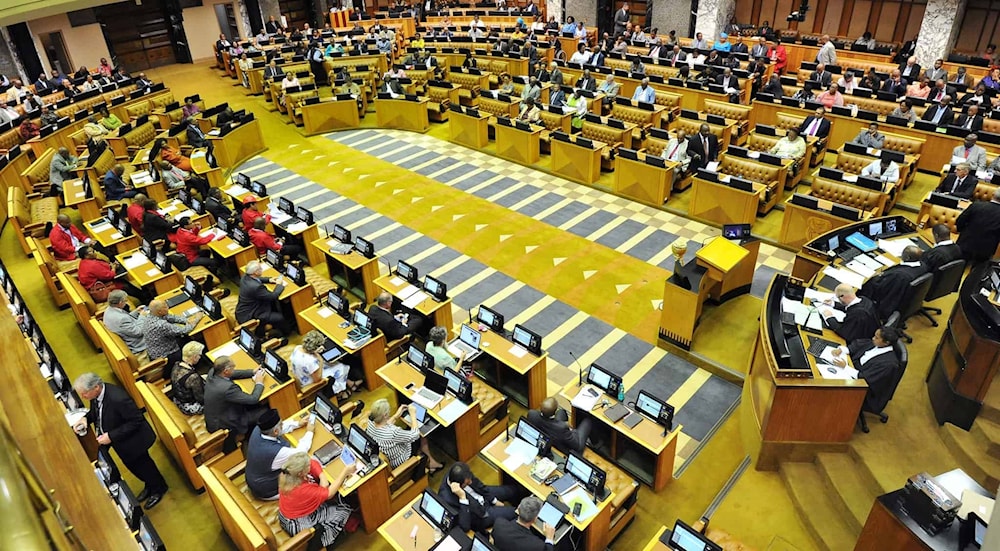South Africa's ANC eyes unity gov. after losing assembly majority
The African National Congress is in discussions with five other parties over the formation of the upcoming government.
-

Deputy President Cyril Ramaphosa replying to oral questions in the National Assembly, Parliament, in Cape Town, South Africa. on February 3, 2016 (AFP)
The African National Congress (ANC) party announced on Wednesday its inclination toward establishing a government of national unity in South Africa, less than one week after it lost its three-decade-old majority, requiring it to find allies to maintain its position as the ruling party.
However, the country's second-largest party, the Democratic Alliance (DA), said it will not take part in a government shared with certain smaller adversaries.
A spokesperson for the ANC, Mahlengi Bhengu-Motsiri, told reporters that the party has been involved in discussions with five parties, including the DA.
"At this point in time the conversation is looking at the government of national unity because this is what the people of South Africa said to us," she said in Johannesburg. Bhengu-Motsiri noted that ANC's National Executive Committee will discuss options during a Thursday meeting.
Read more: South Africa's Ramaphosa urges unity after historic ANC setback
In the forthcoming National Assembly, the ANC is poised to secure 159 out of 400 seats, with the DA holding 87 seats. The populist uMkhonto we Sizwe (MK), led by former president Jacob Zuma, is projected to secure 58 seats, followed by the EFF with 39 seats, the socially conservative Inkatha Freedom Party with 17 seats, and the far-right Patriotic Alliance (PA) with nine.
"If the (ANC's) idea is also to extend an invitation to all parties above a certain threshold to serve in the executive, which would include MK, the EFF and the PA, our negotiating team will not be empowered to conclude such an arrangement," said DA spokesperson Werner Horn.
"The current decision is that we will not join these parties in a government," he added, pointing out that the party's federal governing bodies will be the party to agree upon and approve any change of position.
Doors open
An internal ANC discussion paper, confirmed by Reuters on Wednesday, suggests that forming a unity government is seen as the most inclusive option for the party. This approach would enable the ANC to sidestep selecting a coalition partner that might not resonate well with its base.
However, the document also acknowledges the potential drawbacks of such a government, including the risk of instability and gridlock due to the necessity of managing numerous partners with divergent interests.
Read more: South Africa's ANC supports motion to shut down Israeli embassy
Bhengu-Motsiri stated that the ANC's goal was to bring together the widest spectrum of societal sectors in support of the upcoming government. She mentioned that the timeline for concluding discussions was less than a week.
Additionally, the spokesperson emphasized that President Cyril Ramaphosa, the leader of the party, would remain in his position. She cautioned other parties against insisting on his removal as a prerequisite for participating in the government.
"He has shepherded this ship of the ANC and team South Africa very well," she told state-run news agency SABC. "So our president is going nowhere. And anyone that intimates the thought about 'we are willing to go into a coalition with you but get rid of President Cyril Ramaphosa' can forget talking to us."
Read more: South Africa ANC party calls for more Global South inclusion in BRICS
Bhengu-Motsiri mentioned that her party reached out to Zuma's MK party but was declined.
"Our door remains open," she said.
Zuma, who resigned as president in 2018 amid corruption scandals, was subsequently imprisoned for contempt of court for his refusal to cooperate with a corruption inquiry. He has since become a staunch opponent of Ramaphosa. Despite this, Zuma maintains popularity in his home province of KwaZulu-Natal.

 4 Min Read
4 Min Read








